North Korean Refugee Stories: Meet Yoon Suk

Yoon Suk has vivid, happy memories of growing up in North Korea. She was raised during a time when state-socialism was relatively functioning, and the government could provide basic necessities to its citizens. She remembers wearing beautiful nylon (a highly-sought after fabric back in the earlier days of North Korea) uniforms with bows and red, patent-leather shoes to school. She also had a passion for the arts and performed frequently on stage. But as she grew older, the shine in her shoes began to fade and the hunger in her belly began to grow.
After the collapse of the Soviet Union, North Korea lost crucial sources of subsidized trade and aid and the North Korean economy crashed. It was during this time that Yoon Suk got married, but what should have been a happy time in her life ended up being far from it. The regime’s mismanaged agricultural and environmental policies were confounded by harsh weather, plunging the country into a severe famine that lasted for years. Yoon Suk and her husband struggled to survive on the meager rations they received—and they were not alone. During this period, an estimated one million people died from starvation, while many of those who survived suffered immensely.
Yoon Suk, knowing that she had to do something to keep her family alive during the most difficult years of the “Arduous March,” turned to the jangmadang—small, illegal markets where people sold and traded anything they could for food. Yoon Suk was like many North Korean women in this new reality, abandoning her traditional role for market activities. Unfortunately, running her modest merchant business was more challenging than she had anticipated and she struggled to keep it afloat. As the situation grew worse, she discontinued her business and looked for other ways to support her family, which had grown by two with the birth of her sons. It was during this time that she learned that life might be better in booming China.
As recently as three decades ago, Chinese people were on average poorer than their North Korean neighbors. But China’s economic reforms have produced wealth and opportunities that are the envy of nearly all North Koreans today. Since North Korea’s economic collapse, which lead to unprecedented cross-border movement and inflows of Chinese goods and media, North Koreans have gained a painful awareness of just how far their formerly impoverished Chinese neighbors have come.

But it’s extremely risky for North Koreans to escape their country. The North Korean regime makes it illegal to leave without explicit permission and if Yoon Suk was caught trying to escape, or caught in China and sent back, she would be punished severely. Yet, the opportunity was too great to pass up and she fled for the first time in the mid-2000s.
Once she arrived, alone in a foreign country where she didn’t speak the language, Yoon Suk was sold to a Chinese man as his bride. China’s lack of marriageable women, particularly in rural areas of the northeast, creates high demand for female North Korean refugees like Yoon Suk. Without legal status and no protection from the authorities, these women are often kidnapped by sex traffickers and sold, sometimes for as little as $200.

Even though she was now living with a Chinese man, Yoon Suk still wasn’t safe from the watchful eye of the Chinese authorities. North Korean refugees’ well-founded fear of persecution if repatriated means that they should be protected under international refugee law. However, the Chinese government labels them as “economic migrants,” so they can forcibly send them back, as per their agreement with the North Korean regime. Yoon Suk was caught by Chinese police not even a month after arriving and was forcibly repatriated back to North Korea. There, the authorities sent her to a prison camp, where she was abused, beaten, and starved.
After all she had gone through, Yoon Suk was still undeterred from finding freedom outside of North Korea. She escaped again to China shortly after her release from the prison camp. She was sold off three times by traffickers, again under the pretense that she was going to be given work. With the last husband, she had her beautiful daughter.
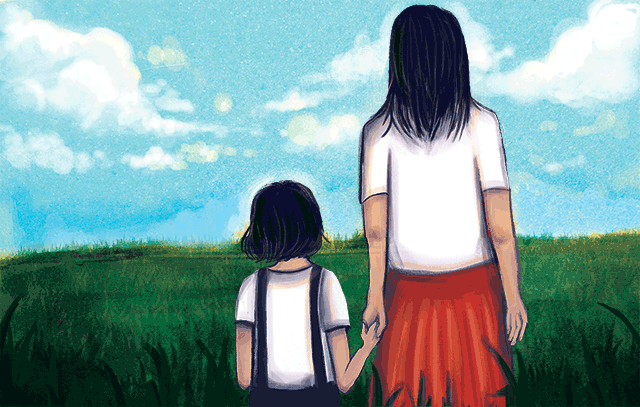
Yoon Suk wanted to give her daughter a better life, and knew that would not be possible in China. Without the proper documentation, her daughter would have difficulty even going to school and would be denied the opportunities available to other Chinese children. Yoon Suk and her daughter escaped China together through Liberty in North Korea’s network and are now on their way to safety in South Korea.
Yoon Suk is excited for the life and opportunities that lie ahead of her. She’s a talented cook and wants to explore the option of obtaining a culinary certificate in South Korea. She also has high hopes for her daughter, who loves art just like her mother did as a young girl, and wants to enroll her in dance and painting lessons. Yoon Suk’s greatest wish is to reunite with her two adult sons someday. She often dreams about appearing on TV to send a message to her sons, showing them she’s alive and well.
Thank you for helping supply the funds for Yoon Suk’s rescue. Your efforts have changed her life and have provided the opportunity for her to enjoy her new LIBERTY.
Fundraise or donate to help rescue more North Korean refugees today!
How A North Korean Defector Sends Money Back Home
It may seem like North and South Korea are completely cut off from each other, but even after decades of separation, channels of communication persist. Defectors who have made it to freedom are bridging the gap, connecting people inside North Korea to the world beyond. Through extensive broker networks, they send back money and information, accelerating change in the world’s most authoritarian country.
Through this process known as remittances, millions of dollars are sent into the country every year, representing huge spending power. Here’s how they do it!
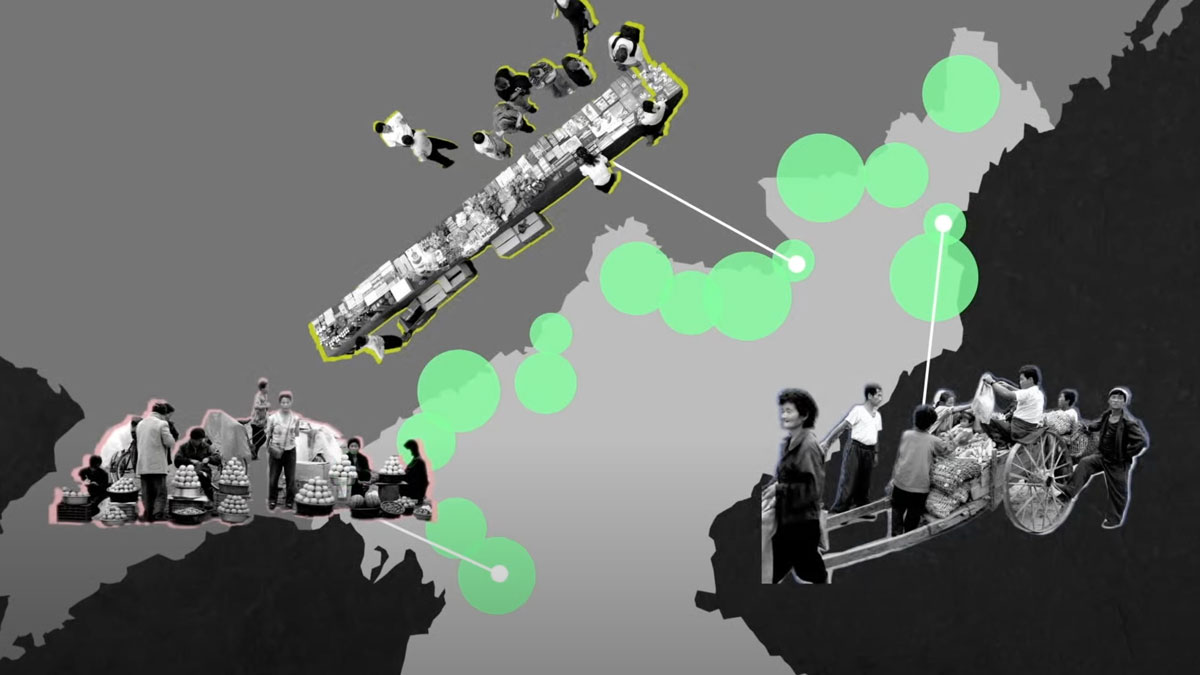
Reconnecting with Family
To send money back home, North Korean refugees must first contact their families. They hire brokers to find their relatives and arrange illicit phone calls close to the border with China, where smuggled Chinese cell phones can connect to international networks. In North Korea, people are often wary of such brokers, so they may have to be convinced with codewords or childhood nicknames that only the family would know, or recognizable handwriting and photos.
To avoid being caught, contact is often made from the mountain at night, or using a series of text or voice messages sent through apps like Wechat and quickly deleted. When the call finally happens, it can be emotional for both sides.
“You hear someone say, ‘Okay you’re connected, you can speak now.’ But no one says anything to each other. You just hear a high-pitched tone, and silence. Could this be real? You’re just crying, and can’t even speak.”
– Miso, escaped North Korea in 2010
How Remittances Work
There are different ways to send money to North Korea, but a simple version involves three parties: A North Korean resettled in South Korea, a remittance broker in North Korea, and the recipient in North Korea.
- A resettled North Korean, makes a request to a remittance broker to arrange a transfer. They wire money to a Chinese account controlled by that broker.
- The remittance broker in North Korea uses a smuggled Chinese phone to confirm receipt of the funds.
- After taking a hefty commission, they give cash to the refugee’s family. The family can confirm receipt of the money by sending a photo, video, or voice message back, so the sender can be confident that they’ve not been scammed.
With this process, the remittance broker in North Korea occasionally needs to replenish their cash on hand. This could happen through the physical smuggling of cash, but oftentimes money from their Chinese bank account is used to buy goods in China that are then sold in North Korea, generating cash. In this way, physical money never actually has to cross borders.
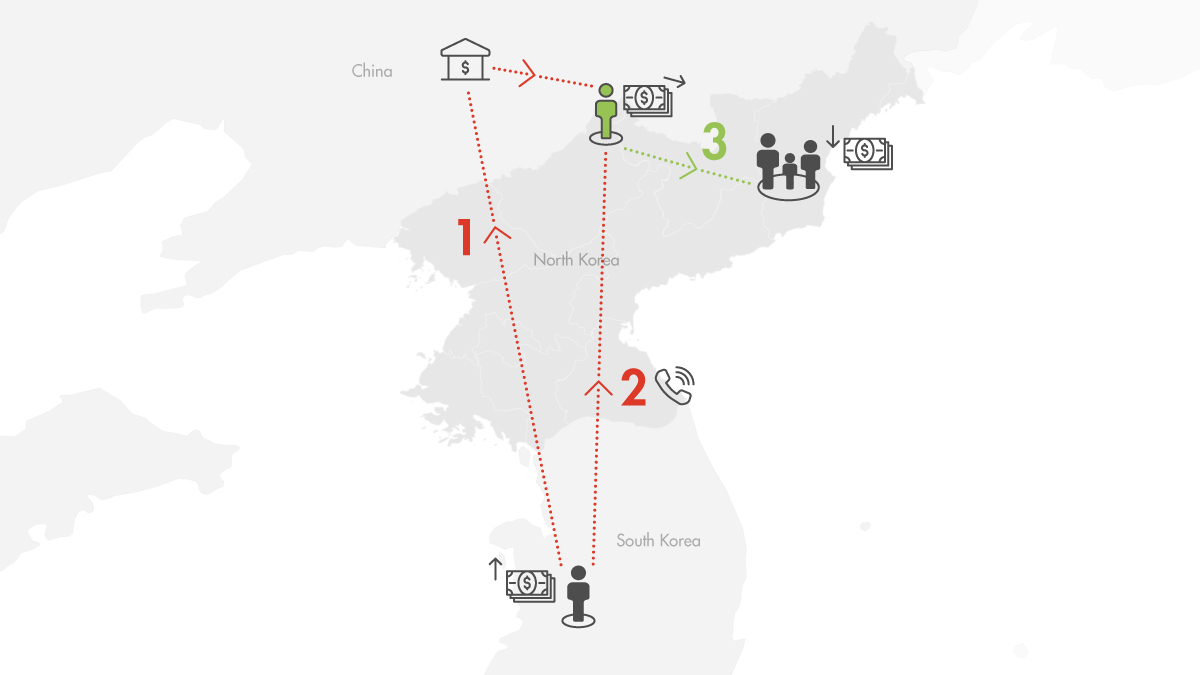
The Power to Change Lives
North Korea is one of the poorest countries in the world, whereas South Korea is one of the richest. Therefore remittances from relatives in South Korea or elsewhere can be absolutely transformative. The money is spent on almost everything, including food, clothing, shoes, medicine, housing, transport, and bribes to keep the family safe.
“I’ve sent money back to North Korea ever since I resettled in South Korea. I send an average of $1,500 a year. My parents used the money to buy a house! They’re also going to use it to help my younger brother escape and come to South Korea.”
– Jeonghyuk, resettled North Korean refugee
With new resources also comes new opportunities. North Koreans who never had the means before can now think about starting a business at the Jangmadang, or market. Since the collapse of the regime’s socialist economy in the 1990s, the markets have become essential to making a living. The flow of remittances is increasing trade, food security, marketization, and entrepreneurship, empowering ordinary North Koreans to gain autonomy.
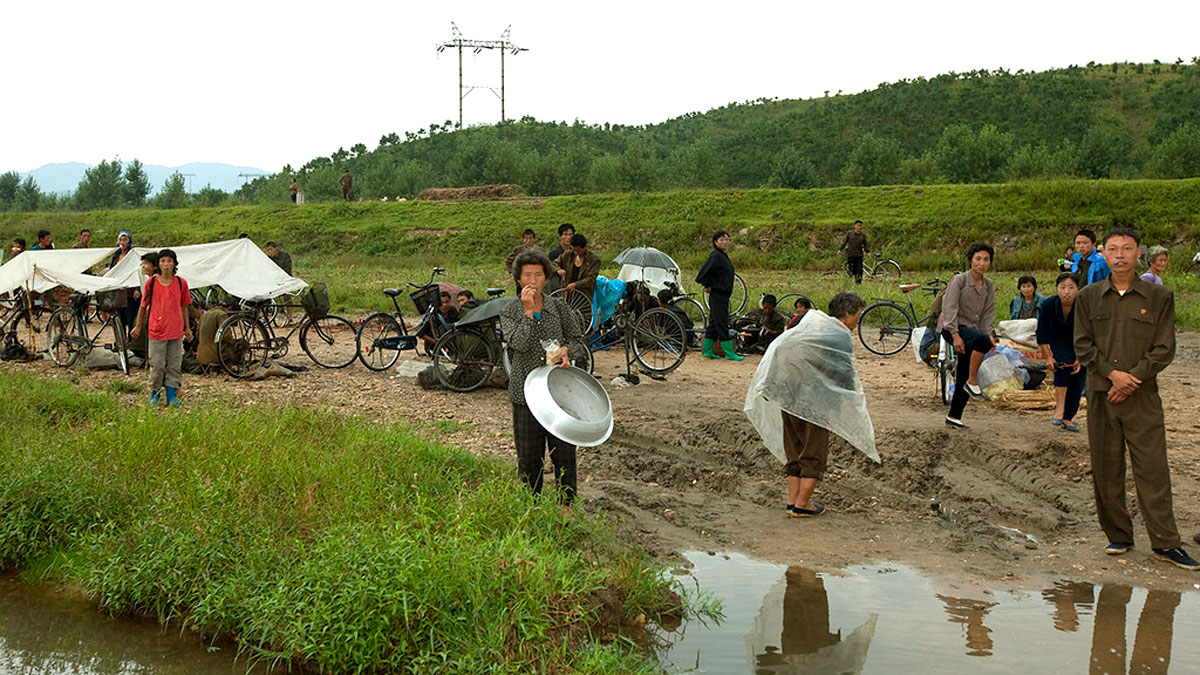
A Ripple Effect
Along with money, North Korean refugees send back news and information from the outside world. At first, family members back home may not want to hear about life beyond the border. Decades of propaganda villainizing the outside world can be difficult to overcome, and if caught in communication with defectors, they could face serious punishment.
But as money continues to flow in, many people can’t help but be curious- what do their relatives outside do to make a living? What kind of house do they live in? Is life there like the K-dramas smuggled into North Korea? Conversely, defectors ask their family members, what they can do with the money in North Korea? This exchange of information is incredibly valuable, providing a glimpse into the most closed society on earth.
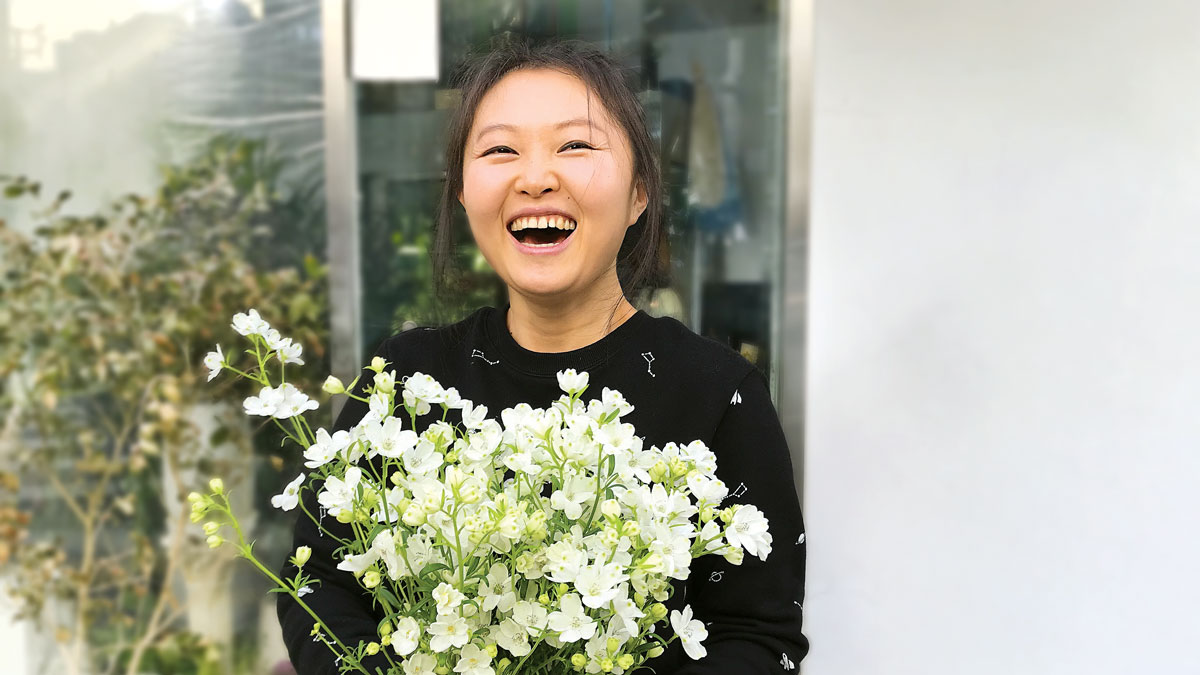
The flow of information into North Korea erodes the regime’s propaganda and changes worldviews. As the people learn more about the wealth and opportunities of the outside world, some may also risk their lives to escape. Money sent from remittances can also be used to fund this dangerous journey.
“When I first contacted my family back in North Korea after I resettled in South Korea, they didn’t believe that I was doing well here. My parents even resented me a little for leaving. But after I sent them money and told them more about my life here, their views changed. Now they realize that the regime has been lying to them and they’re not as loyal anymore. I have become a pioneer of freedom to my family back in North Korea.”
– Jo Eun, rescued by LiNK in 2017
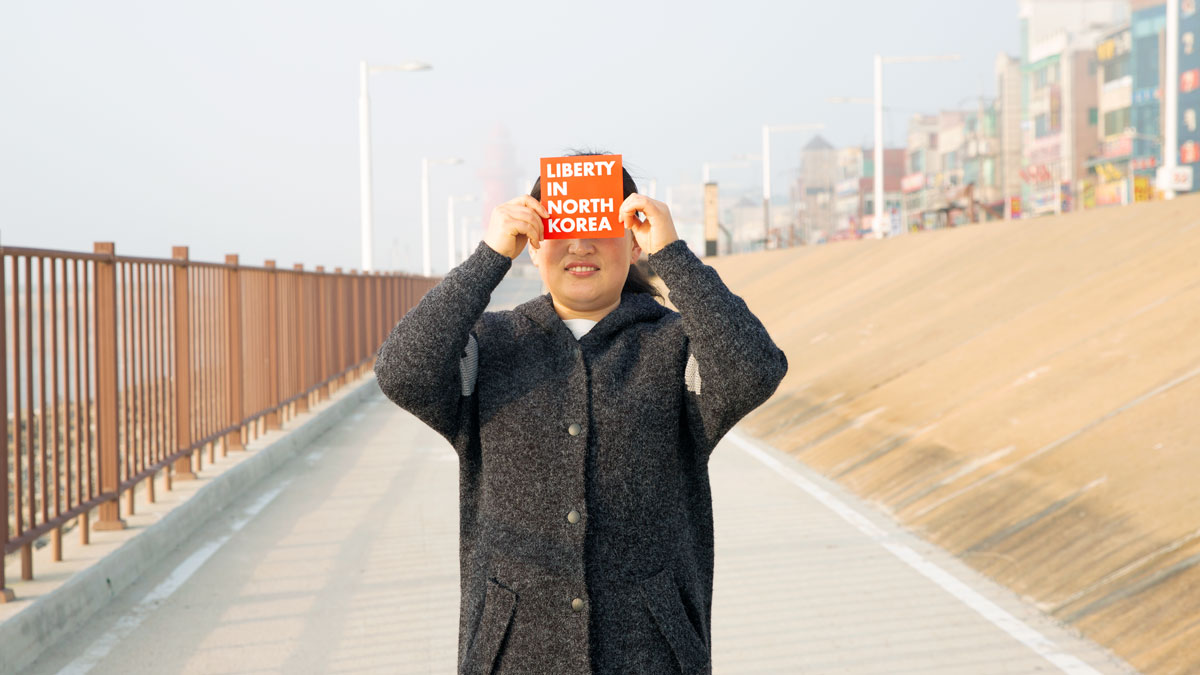
Agents of Change
Remittances are about more than just the movement of money. Refugees who have been separated from their families aren’t able to go back home themselves, but can still care for their loved ones in some way. Every phone call into the country and every dollar sent back represents one small step towards the day when the North Korean people finally achieve their freedom.
More than 33,000 North Korean refugees have made it to freedom, and although it has become more difficult during the pandemic, surveys report that 65.7% have sent money back to North Korea. At LiNK, we’re committed to working with and building the capacity of North Korean refugees so they can succeed in their new lives and make an even bigger impact in their communities and on this issue.




